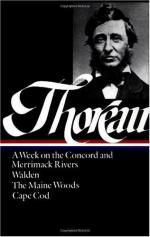“Therefore, as
doth the pilgrim, whom the night
Hastes darkly to imprison
on his way,
Think on thy home, my
soul, and think aright
Of what’s yet
left thee of life’s wasting day:
Thy sun posts westward,
passed is thy morn,
And twice it is not
given thee to be born.”
The sun-setting presumed all men at leisure, and in a contemplative mood; but the farmer’s boy only whistled the more thoughtfully as he drove his cows home from pasture, and the teamster refrained from cracking his whip, and guided his team with a subdued voice. The last vestiges of daylight at length disappeared, and as we rowed silently along with our backs toward home through the darkness, only a few stars being visible, we had little to say, but sat absorbed in thought, or in silence listened to the monotonous sound of our oars, a sort of rudimental music, suitable for the ear of Night and the acoustics of her dimly lighted halls;
“Pulsae referunt ad sidera valles,”
and the valleys echoed the sound to the stars.
As we looked up in silence to those distant lights, we were reminded that it was a rare imagination which first taught that the stars are worlds, and had conferred a great benefit on mankind. It is recorded in the Chronicle of Bernaldez, that in Columbus’s first voyage the natives “pointed towards the heavens, making signs that they believed that there was all power and holiness.” We have reason to be grateful for celestial phenomena, for they chiefly answer to the ideal in man. The stars are distant and unobtrusive, but bright and enduring as our fairest and most memorable experiences. “Let the immortal depth of your soul lead you, but earnestly extend your eyes upwards.”
As the truest society approaches always nearer to solitude, so the most excellent speech finally falls into Silence. Silence is audible to all men, at all times, and in all places. She is when we hear inwardly, sound when we hear outwardly. Creation has not displaced her, but is her visible framework and foil. All sounds are her servants, and purveyors, proclaiming not only that their mistress is, but is a rare mistress, and earnestly to be sought




